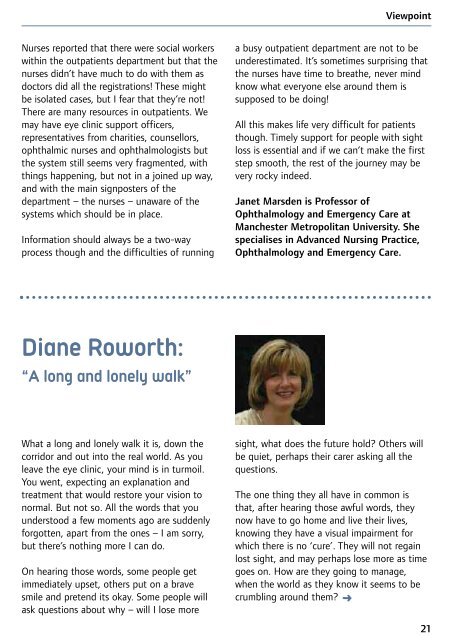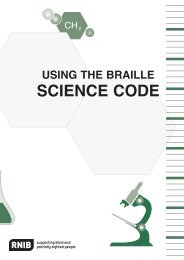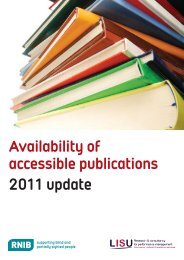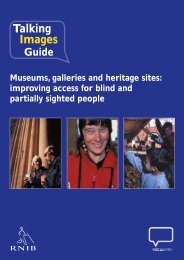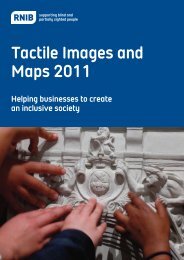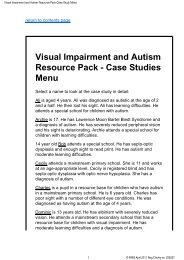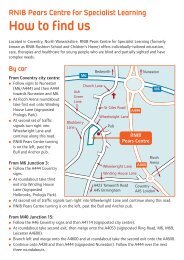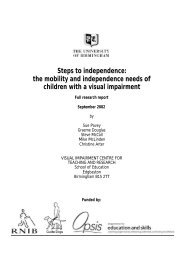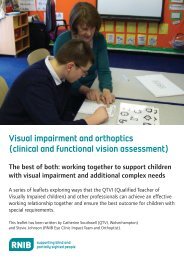Reflections on sight loss - RNIB
Reflections on sight loss - RNIB
Reflections on sight loss - RNIB
You also want an ePaper? Increase the reach of your titles
YUMPU automatically turns print PDFs into web optimized ePapers that Google loves.
Viewpoint<br />
Nurses reported that there were social workers<br />
within the outpatients department but that the<br />
nurses didn’t have much to do with them as<br />
doctors did all the registrati<strong>on</strong>s! These might<br />
be isolated cases, but I fear that they’re not!<br />
There are many resources in outpatients. We<br />
may have eye clinic support officers,<br />
representatives from charities, counsellors,<br />
ophthalmic nurses and ophthalmologists but<br />
the system still seems very fragmented, with<br />
things happening, but not in a joined up way,<br />
and with the main signposters of the<br />
department – the nurses – unaware of the<br />
systems which should be in place.<br />
Informati<strong>on</strong> should always be a two-way<br />
process though and the difficulties of running<br />
a busy outpatient department are not to be<br />
underestimated. It’s sometimes surprising that<br />
the nurses have time to breathe, never mind<br />
know what every<strong>on</strong>e else around them is<br />
supposed to be doing!<br />
All this makes life very difficult for patients<br />
though. Timely support for people with <strong>sight</strong><br />
<strong>loss</strong> is essential and if we can’t make the first<br />
step smooth, the rest of the journey may be<br />
very rocky indeed.<br />
Janet Marsden is Professor of<br />
Ophthalmology and Emergency Care at<br />
Manchester Metropolitan University. She<br />
specialises in Advanced Nursing Practice,<br />
Ophthalmology and Emergency Care.<br />
Diane Roworth:<br />
“A l<strong>on</strong>g and l<strong>on</strong>ely walk”<br />
What a l<strong>on</strong>g and l<strong>on</strong>ely walk it is, down the<br />
corridor and out into the real world. As you<br />
leave the eye clinic, your mind is in turmoil.<br />
You went, expecting an explanati<strong>on</strong> and<br />
treatment that would restore your visi<strong>on</strong> to<br />
normal. But not so. All the words that you<br />
understood a few moments ago are suddenly<br />
forgotten, apart from the <strong>on</strong>es – I am sorry,<br />
but there’s nothing more I can do.<br />
On hearing those words, some people get<br />
immediately upset, others put <strong>on</strong> a brave<br />
smile and pretend its okay. Some people will<br />
ask questi<strong>on</strong>s about why – will I lose more<br />
<strong>sight</strong>, what does the future hold? Others will<br />
be quiet, perhaps their carer asking all the<br />
questi<strong>on</strong>s.<br />
The <strong>on</strong>e thing they all have in comm<strong>on</strong> is<br />
that, after hearing those awful words, they<br />
now have to go home and live their lives,<br />
knowing they have a visual impairment for<br />
which there is no ‘cure’. They will not regain<br />
lost <strong>sight</strong>, and may perhaps lose more as time<br />
goes <strong>on</strong>. How are they going to manage,<br />
when the world as they know it seems to be<br />
crumbling around them? ➜<br />
21


